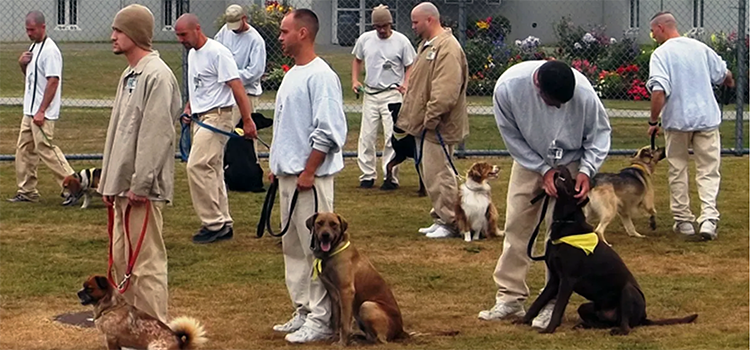Prison time is hard time. Depending on where an inmate is locked up, they can spend anywhere from 21-23 hours a day in their cells, regardless of the severity of their crimes. Wherever possible, inmates who really want to get out are making the most of that time. But it turns out there is one job that is perfectly suited to someone with that much time on their hands: training service dogs for wounded veterans.

America’s VetDogs employs inmates like Tyrell Sinclair, an inmate at Connecticut’s Enfield Correctional Facility, to train service dogs destined for wounded veterans – and the dogs work wonders for the inmates as well. For Sinclair, it gives him something to do, something to look forward to every day. More than that, the increased attention the inmates are able to give the trainee dogs cuts the training time down to just one year instead of two to five years.
“After committing a crime, being in here, you just sit around and think about how bad things are, how bad a person I am for being in this predicament,” said Sinclair. “Once I got the dog and got into the program, things were better. It’s like a whole different outlook.”

Sinclair says he was amazed at the abilities the dogs have once they are subject to the proper training and skills.
“It amazed me,” he said.
But it’s not just the constant companionship of man’s best friend that helps inmates like Sinclair through their jail time. The inmates know the dogs will not be with them for very long if all goes according to plan. It’s knowing that the dogs they train are destined to help someone who served their country that gives the inmates the boost in confidence.
“It almost makes me feel like a proud dad.”
Mark Tyler, who oversees the Enfield program for America’s VetDogs, believes the prisoner’s inclination toward the dogs (and vice versa) is a natural one and the program is a win-win situation for everyone involved. The numbers support that belief. Around 85 percent of Enfield inmates will end up back in Enfield after their release, for the same crime or another crime. For inmates who train dogs, that number drops to 25 percent.
“They know all too well the crime they committed will likely become an extension of who they are,” Tyler said of the prisoners. “The dog doesn’t care what that person did in the past, he cares about who they are today.”
This article originally appeared on We Are The Mighty
This Long-Forgotten Unit was the Direct Predecessor of Delta
Differences Between Delta Force and SEAL Team 6
Airmen Prepare for Heavenly Warefare in Space Flag
Follow We Are The Mighty on Twitter
READ NEXT
(VIDEO) Submit to G.I. Jobs Today!
6 Veteran Influencers to Follow into 2019






